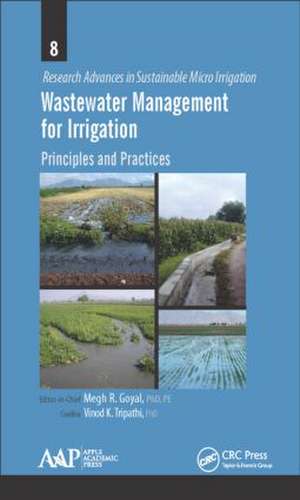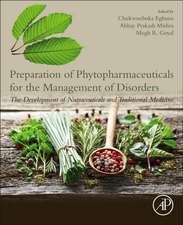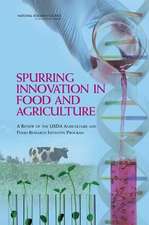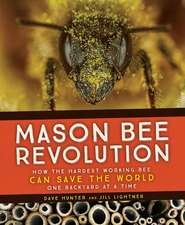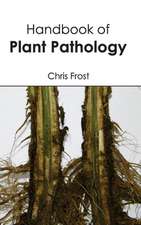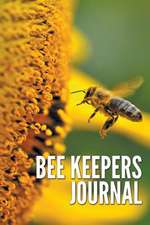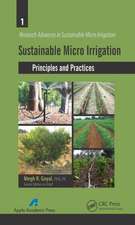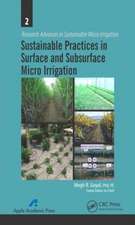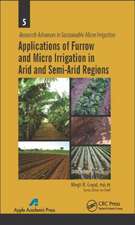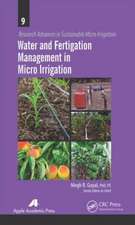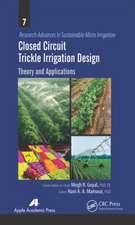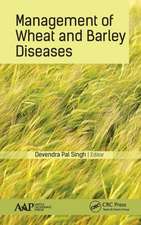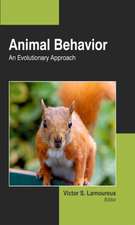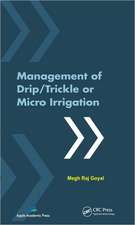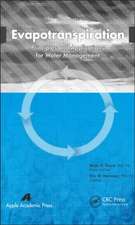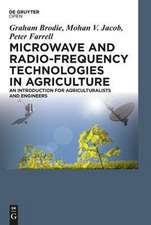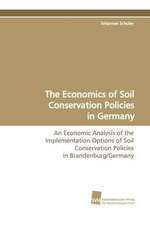Wastewater Management for Irrigation: Principles and Practices: Research Advances in Sustainable Micro Irrigation
Editat de Megh R. Goyalen Limba Engleză Hardback – 6 oct 2015
This important book focuses on the use of wastewater as a valuable resource for agricultural micro irrigation purposes. It covers effective wastewater management practices in a variety of climates, including semi-arid regions and others; how to perform effective evaluations to gauge the quality of the water on plants, including potatoes, maize, and eggplant; and the cost–benefit of using wastewater. It addresses the sources of wastewater for irrigation and the problems along with challenges, including water quality, clogging, soil quality, and more.
The mission of this compendium is to serve as a reference manual for professionals in biological and civil engineering, horticulture, soil and crop science, and agronomy, as well as for graduate and undergraduate students in related fields. It will be a valuable reference for professionals who work with micro irrigation/wastewater and water management, for technical agricultural centers, irrigation centers, agricultural extension services, and other agencies that work with micro irrigation programs.
| Toate formatele și edițiile | Preț | Express |
|---|---|---|
| Paperback (1) | 579.62 lei 6-8 săpt. | |
| Apple Academic Press Inc. – 31 mar 2021 | 579.62 lei 6-8 săpt. | |
| Hardback (1) | 770.74 lei 6-8 săpt. | |
| Apple Academic Press Inc. – 6 oct 2015 | 770.74 lei 6-8 săpt. |
Preț: 770.74 lei
Preț vechi: 1031.26 lei
-25% Nou
Puncte Express: 1156
Preț estimativ în valută:
147.52€ • 159.23$ • 123.69£
147.52€ • 159.23$ • 123.69£
Carte tipărită la comandă
Livrare economică 19 aprilie-03 mai
Preluare comenzi: 021 569.72.76
Specificații
ISBN-13: 9781771881203
ISBN-10: 1771881208
Pagini: 474
Ilustrații: 57 black & white illustrations
Dimensiuni: 152 x 229 x 30 mm
Greutate: 0.82 kg
Ediția:1
Editura: Apple Academic Press Inc.
Colecția Apple Academic Press
Seria Research Advances in Sustainable Micro Irrigation
ISBN-10: 1771881208
Pagini: 474
Ilustrații: 57 black & white illustrations
Dimensiuni: 152 x 229 x 30 mm
Greutate: 0.82 kg
Ediția:1
Editura: Apple Academic Press Inc.
Colecția Apple Academic Press
Seria Research Advances in Sustainable Micro Irrigation
Public țintă
Academic and PostgraduateCuprins
Introduction. PART I: Irrigation Management. PART II: Wastewater Management Practices. Index.
Notă biografică
Megh R. Goyal, PhD, PE, is a retired professor in agricultural and biomedical engineering from the General Engineering Department in the College of Engineering at University of Puerto Rico–Mayaguez Campus; and senior acquisitions editor and senior technical editor-in-chief in agriculture and biomedical engineering for Apple Academic Press Inc. He received his BSc in engineering in 1971 from Punjab Agricultural University, Ludhiana, India; his MSc in 1977 and PhD in 1979 from the Ohio State University, Columbus; and his master of divinity in 2001 from Puerto Rico Evangelical Seminary, Hato Rey, Puerto Rico, USA. He spent one-year sabbatical leave in 2002–2003 at the Biomedical Engineering Department at Florida International University in Miami, Florida, USA. Since 1971, he has worked as soil conservation inspector (1971); research assistant at Haryana Agricultural University (1972–75) and Ohio State University (1975–79); research agricultural engineer/professor at the Department of Agricultural Engineering of UPRM (1979–1997); and professor in agricultural and biomedical engineering in the General Engineering Department of UPRM (1997–2012).
He was the first agricultural engineer to receive a professional license in agricultural engineering in 1986 from the College of Engineers and Surveyors of Puerto Rico. On September 16, 2005, he was proclaimed "Father of Irrigation Engineering in Puerto Rico for the twentieth century" by the ASABE, Puerto Rico Section, for his pioneering work on micro irrigation, evapotranspiration, agroclimatology, and soil and water engineering. During his professional career of 45 years, he has received awards such as Scientist of the Year, Blue Ribbon Extension Award, Research Paper Award, Nolan Mitchell Young Extension Worker Award, Agricultural Engineer of the Year, Citations by Mayors of Juana Diaz and Ponce, Membership Grand Prize for ASAE Campaign, Felix Castro Rodriguez Academic Excellence, Rashtrya Ratan Award and Bharat Excellence Award and Gold Medal, Domingo Marrero Navarro Prize, Adopted Son of Moca, Irrigation Protagonist of UPRM, and Man of Drip Irrigation by Mayor of Municipalities of Mayaguez/Caguas/Ponce and Senate/Secretary of Agriculture of ELA, Puerto Rico.
He has authored more than 200 journal articles and textbooks, including Elements of Agroclimatology (Spanish) by UNISARC, Colombia, and two Bibliographies on Drip Irrigation. Apple Academic Press Inc. (AAP) has published his books, namely Biofluid Dynamics of Human Body, Management of Drip/Trickle or Micro Irrigation, Evapotranspiration: Principles and Applications for Water Management, Sustainable Micro Irrigation Design Systems for Agricultural Crops: Practices and Theory, Biomechanics of Artificial Organs and Prostheses, and Scientific and Technical Terms in Bioengineering and Biotechnology. During 2014–15, AAP is publishing his ten-volume set, Research Advances in Sustainable Micro Irrigation.
He was the first agricultural engineer to receive a professional license in agricultural engineering in 1986 from the College of Engineers and Surveyors of Puerto Rico. On September 16, 2005, he was proclaimed "Father of Irrigation Engineering in Puerto Rico for the twentieth century" by the ASABE, Puerto Rico Section, for his pioneering work on micro irrigation, evapotranspiration, agroclimatology, and soil and water engineering. During his professional career of 45 years, he has received awards such as Scientist of the Year, Blue Ribbon Extension Award, Research Paper Award, Nolan Mitchell Young Extension Worker Award, Agricultural Engineer of the Year, Citations by Mayors of Juana Diaz and Ponce, Membership Grand Prize for ASAE Campaign, Felix Castro Rodriguez Academic Excellence, Rashtrya Ratan Award and Bharat Excellence Award and Gold Medal, Domingo Marrero Navarro Prize, Adopted Son of Moca, Irrigation Protagonist of UPRM, and Man of Drip Irrigation by Mayor of Municipalities of Mayaguez/Caguas/Ponce and Senate/Secretary of Agriculture of ELA, Puerto Rico.
He has authored more than 200 journal articles and textbooks, including Elements of Agroclimatology (Spanish) by UNISARC, Colombia, and two Bibliographies on Drip Irrigation. Apple Academic Press Inc. (AAP) has published his books, namely Biofluid Dynamics of Human Body, Management of Drip/Trickle or Micro Irrigation, Evapotranspiration: Principles and Applications for Water Management, Sustainable Micro Irrigation Design Systems for Agricultural Crops: Practices and Theory, Biomechanics of Artificial Organs and Prostheses, and Scientific and Technical Terms in Bioengineering and Biotechnology. During 2014–15, AAP is publishing his ten-volume set, Research Advances in Sustainable Micro Irrigation.
Descriere
The reuse of wastewater in irrigation is being practiced only recently to solve water scarcity problems in agriculture. Management of water, soil, crop, and operational procedures, including precautions to protect farm workers, play an important role in the successful use of sewage effluent for irrigation. Appropriate water management practices must be followed to prevent salinization. If salt is not flushed out of the root zone by leaching and removed from the soil by effective drainage, salinity problems can build up rapidly. Leaching and drainage are, thus, two important water management practices to avoid salinization of soils. One of the options that may be available to farmers is the blending of treated sewage with conventional sources of water to obtain a blended water of acceptable salinity level.
This important book focuses on the use of wastewater as a valuable resource for agricultural micro irrigation purposes. It covers effective wastewater management practices in a variety of climates, including semi-arid regions and others; how to perform effective evaluations to gauge the quality of the water on plants, including potatoes, maize, and eggplant; and the cost–benefit of using wastewater. It addresses the sources of wastewater for irrigation and the problems along with challenges, including water quality, clogging, soil quality, and more.
The mission of this compendium is to serve as a reference manual for professionals in biological and civil engineering, horticulture, soil and crop science, and agronomy, as well as for graduate and undergraduate students in related fields. It will be a valuable reference for professionals who work with micro irrigation/wastewater and water management, for technical agricultural centers, irrigation centers, agricultural extension services, and other agencies that work with micro irrigation programs.
Share this Title
Recommend to
Librarian
